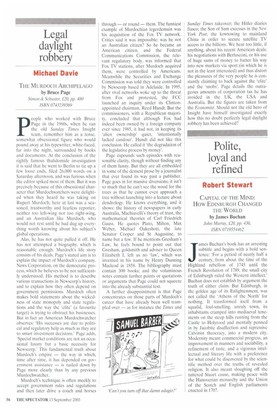Legal daylight robbery
Michael Davie
THE MURDOCH ARCHIPELAGO by Bruce Page Simon & Schuster, £20, pp. 480 ISBN 0743239369 people who worked with Bruce Page in the 1960s, when he ran the old Sunday Times Insight team, remember him as a tense, somewhat obsessional figure who would pound away at his typewriter, white-faced, far into the night, surrounded by books and documents. At the conclusion of the rightly famous thalidomide investigation it is said that he went to Berlin to tie up a few loose ends, filed 26,000 words on a Saturday afternoon, and was furious when the editor spiked most of them. But it was precisely because of this obsessional character that Murdochwatchers were delighted when they heard he was taking on Rupert Murdoch; here at last was a seasoned, trustworthy and fearless reporter, neither too left-wing nor too right-wing, and an Australian like Murdoch, who would not rest until he had dug up everything worth knowing about his subject's global operations.
Alas, he has not quite pulled it off. He has not attempted a biography, which is reasonable enough. Murdoch's life story consists of his deals. Page's stated aim is to explain the impact of Murdoch's company, News Corporation, on the democratic process, which he believes to be not sufficiently understood. His method is to describe various transactions in Newscorp's history, and to explain how they often depend on government permissions. Murdoch often makes bold statements about the wickedness of state monopoly and state regulations and the way the 'elite' (a favourite target) is trying to obstruct his businesses. But in fact an American Murdochwatcher observes: 'His successes are due to political and regulatory help as much as they are to smart investment decisions.' Page adds, 'Special market conditions are not an occasional luxury but a basic necessity for Newscorp.This fundamental truth about Murdoch's empire — the way in which, time after time, it has depended on government assistance — is nailed down by Page more clearly than by any previous Murdochwatcher.
Murdoch's technique is often meekly to accept government rules and regulations and then later drive a coach and horses
through — or round — them. The funniest example of Murdochian legerdemain was his acquisition of the Fox TV network. Critics said it was impossible: was he not an Australian citizen? So he became an American citizen, and the Federal Communications Commission, the relevant regulatory body, was informed that Fox TV stations, after Murdoch acquired them, were controlled by Americans. Meanwhile the Securities and Exchange Commission was told they were controlled by Newscorp based in Adelaide. In 1995, after rival networks woke up to the threat from Fox and protested, the FCC launched an inquiry under its Clintonappointed chairman, Reed Hundt. But the commissioners, with a Republican majority, concluded that although Fox had indeed been owned by a foreign company ever since 1985, it had not, in keeping its 'alien ownership' quiet, 'intentionally lacked candour'. Hundt did not like this conclusion. He called it 'the degradation of the legislative process by money'.
Page expounds such episodes with reasonable clarity, though without finding any of them funny. But they are all embedded in some of the densest prose by a journalist that ever found its way past a publisher. Page goes in for massive diversions; it isn't so much that he can't see the wood for the trees as that he cannot even approach a tree without launching into a lecture about dendrology. He knows everything, and it shows: the history of newspapers in early Australia, Machiavelli's theory of trust, the mathematical theories of Carl Friedrich Gauss. He quotes Plato, Milton, Max Weber, Michael Oakeshott, the late Senator Cooper and St Augustine, to name but a few. If he mentions Gresham's Law, he feels bound to point out that Gresham, goldsmith and adviser to Queen Elizabeth I, left us no 'law', which was invented in his name by Henry Dunning Macleod in 1858. The bibliography must contain 300 books; and the voluminous notes contain further points or quotations or arguments that Page could not squeeze into the already substantial text.
A further disappointment is that Page concentrates on those parts of Murdoch's career that have already been well trampled over — as for instance the Times and Sunday Times takeover; the Hitler diaries fiasco; the Son of Sam excesses in the New York Post; the kowtowing to mainland China in order to secure satellite TV access to the billions, We hear too little, if anything, about his recent American deals: his negotiations with Berlusconi, or his use of huge sums of money to batter his way into new markets via sport (in which he is not in the least interested) and thus distort the pleasures of the very people he is constantly claiming to back against the 'elite' and the 'snobs'. Page details the outrageous amounts of corporation tax he has avoided in the UK, the USA and Australia. But the figures are taken from the Economist. Should not the old hero of Insight have himself investigated exactly how this no doubt perfectly legal daylight robbery has been achieved?


























































































 Previous page
Previous page